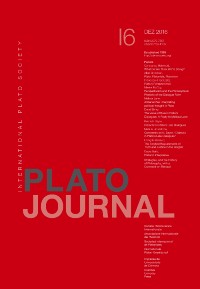Please use this identifier to cite or link to this item:
https://hdl.handle.net/10316.2/41889| DC Field | Value | Language |
|---|---|---|
| dc.contributor.author | Ebrey, David | - |
| dc.date.accessioned | 2017-06-05T10:24:26Z | |
| dc.date.accessioned | 2020-10-04T18:43:20Z | - |
| dc.date.available | 2017-06-05T10:24:26Z | |
| dc.date.available | 2020-10-04T18:43:20Z | - |
| dc.date.issued | 2016 | - |
| dc.identifier.issn | 2079-7567 | - |
| dc.identifier.issn | 2183-4105 (PDF) | - |
| dc.identifier.uri | https://hdl.handle.net/10316.2/41889 | - |
| dc.description.abstract | I examine Melissa Lane’s claim that antianarchia is an element of Plato’s political thought. Plato’s antianarchia, she claims, is his profound rejection of political anarchy and corresponding general commitment to the value of rulers and officeholders. I argue that while Socrates is committed to antianarchia in the Republic and other dialogues, he is not committed to it in the Socratic dialogues. Where we might expect antianarchia in those dialogues we instead find Socrates simply committed to the value of being lawful and the value of being ruled by those with knowledge. I suggest that we can think of the Socratic dialogues as having a distinctive place within the structure of Plato’s corpus without thinking that they were composed earlier in his life or that they served a specific pedagogical function. I end by suggesting that what is most interesting about Plato’s antianarchia is how he develops it in the Republic, which we miss if we are focused on Plato’s general commitments, as opposed to the views he develops in specific dialogues. | eng |
| dc.language.iso | eng | - |
| dc.publisher | Imprensa da Universidade de Coimbra | - |
| dc.rights | open access | - |
| dc.subject | Plato | eng |
| dc.subject | anarchy | eng |
| dc.subject | rule | eng |
| dc.subject | republic | eng |
| dc.subject | apology | eng |
| dc.subject | crito | eng |
| dc.subject | socratic dialogues | eng |
| dc.subject | developmentalism | eng |
| dc.subject | pedagogical reading | eng |
| dc.subject | chronology | eng |
| dc.title | The value of rule in Plato’s dialogues: a reply to Melissa Lane | por |
| dc.type | article | - |
| uc.publication.collection | Plato Journal vol. 16 | - |
| uc.publication.firstPage | 75 | - |
| uc.publication.lastPage | 80 | - |
| uc.publication.location | Coimbra | - |
| uc.publication.journalTitle | Plato Journal | - |
| uc.publication.volume | 16 | por |
| dc.identifier.doi | 10.14195/2183-4105_16_6 | - |
| uc.publication.orderno | 6 | - |
| uc.publication.area | Artes e Humanidades | - |
| uc.publication.manifest | https://dl.uc.pt/json/iiif/10316.2/41889/267771/manifest?manifest=/json/iiif/10316.2/41889/267771/manifest | - |
| uc.publication.thumbnail | https://dl.uc.pt/retrieve/12131583 | - |
| item.fulltext | With Fulltext | - |
| item.grantfulltext | open | - |
| Appears in Collections: | Plato Journal | |
Files in This Item:
| File | Description | Size | Format | |
|---|---|---|---|---|
| the_value_of_rule_in_plato_s_dialogues-a_reply_to_melissa_lane.pdf | 1.21 MB | Adobe PDF |  |
Items in DSpace are protected by copyright, with all rights reserved, unless otherwise indicated.
